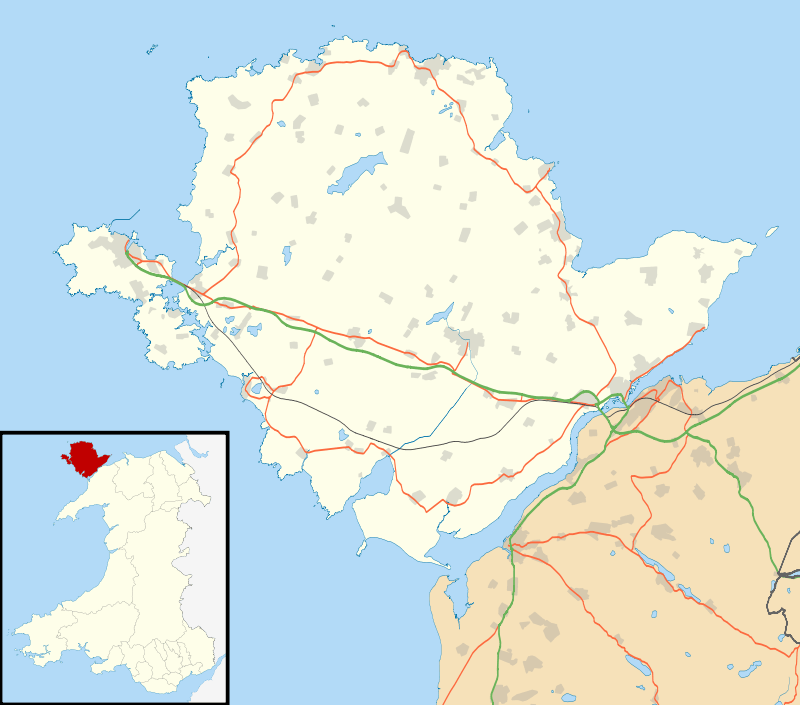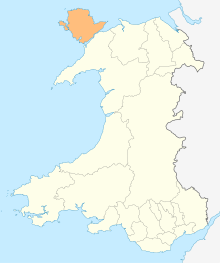Porth Dafarch
Porth Dafarch is a small bay on the west coast of Anglesey in North Wales. The inlet is on the west side of Holy Island, Anglesey about 2 mi (3.2 km) southwest of Holyhead and 1.5 mi (2.4 km) northwest of Trearddur Bay.[1] It has a sandy beach and is a popular visitor destination.
Porth Dafarch
| |
|---|---|
 Beach at Porth Dafarch | |
 Porth Dafarch Location within Anglesey | |
| Community | |
| Principal area | |
| Country | Wales |
| Sovereign state | United Kingdom |
| Police | North Wales |
| Fire | North Wales |
| Ambulance | Welsh |
Toponym
The origins of the name are uncertain. Although some claim that the placename is a contraction of Porth Dau Farch ("Harbour of the Two Stallions"), scholars are fairly sure that this is not the case. Indeed, in documents the name has been recorded as Porth Davagh ("Davagh's Harbour") (1545), Porth Daverch (1878), Porth y Dafarch (1799), Porth y Daferch (1789), and the present Porth Dafarch (since 1838).[2] It has been tentatively suggested that "Tafarch" (which takes a soft mutation after porth to become "Dafarch") was a personal name, albeit not a common one.[3]
Geology
The bay, which is roughly 100 metres across, is created from Precambrian rock that has been eroded into high cliffs and sea caves. As part of Holy Island, Anglesey, it belongs to the large geological feature known as the Monian Supergroup. It opens out southwest into the Irish Sea.
History
Porth Dafarch was used from the mid-17th to early-19th century as an alternative to the main port of Holyhead when it was affected by adverse weather conditions in the Irish Sea. Passengers would use the sheltered bay to set sail for Dublin in Ireland. However, with the commencement of a steam service in 1822 (and the construction of the Holyhead Breakwater), Porth Dafarch was no longer required as an alternative port.[4]. The old customs post can still be seen, dating from 1819. It allowed mail and passengers to be landed on Holyhead Island when Northerly winds made landing at Holyhead impossible. By 1873, the new harbour was completed at Holyhead making the customs post redundant. It has been fenced off from the public due to its poor condition but is a Grade 2 listed building.
The bay is a popular visitor destination because of its sandy beach and the opportunity for rock-pooling.[5] It is also popular for watersports, particularly windsurfing, surfing, canoeing, sailing and jet skiing. Scuba divers are able to view the Missouri, a 3000-ton vessel that was wrecked in 1886 on its way to Boston.[6] The bay is in close proximity to campsites and the Anglesey Coastal Path.
A marine fibre-optic cable that links Ireland to the UK makes landfall at Porth Dafarch. The CeltixConnect, which consists of 72 fibre pairs, was laid over a period of about 30 days between mid-December 2011 and mid-January 2012.[7]
References
| Wikimedia Commons has media related to Porth Dafarch. |
- OS Landranger 114: Anglesey / Ynys Môn. Ordnance Survey. 2016. ISBN 978-0-319-26212-2.
- "Melville Richards Archive Place-Name Database". Place Name Research Centre. Archif Melvyn Richards. Retrieved 14 June 2016.
- "Ynys Môn: Enwau llefydd". BBC Lleol, Gogledd Orllewin. Retrieved 14 June 2016.
- Ayres, George (2011). History of the Mail Routes to Ireland Until 1850. Lulu.com. p. 84. ISBN 978-1-4466-0504-2.
- Martin, Kate. "The joys of rockpooling". The National Trust. Retrieved 14 June 2016.
- "Porth Dafarch Beach". North Wales Holiday Cottages. Retrieved 14 June 2016.
- "Submarine fibre-optic cable boosts Ireland's global connectivity". Engineers Ireland. Retrieved 25 June 2018.
